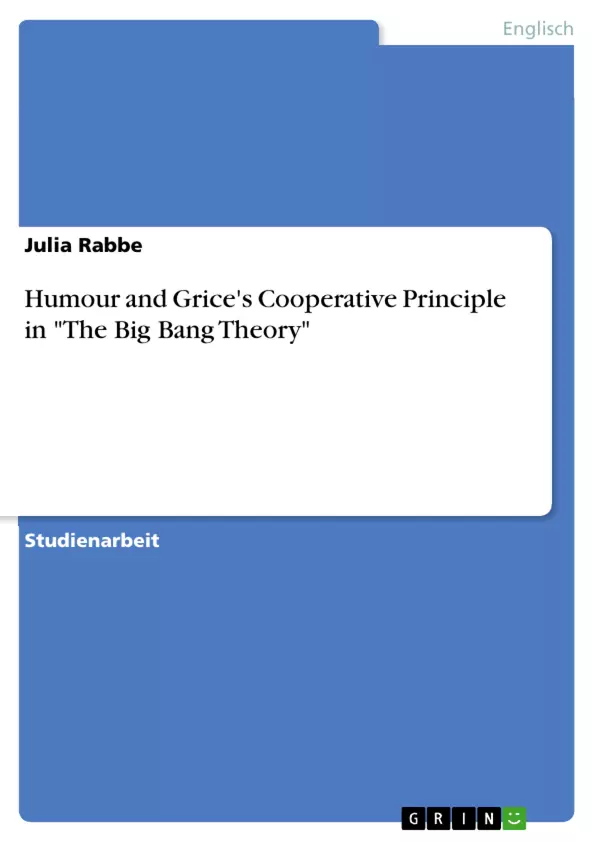This paper focuses on the pragmatic account of the American sitcom "The Big Bang Theory" with Grice and the cooperative principle as its theoretical background. It is based on the assumption that verbal humour violates Grice ́s cooperative principle.
The aim is to explain how humour is generated and perceived in certain contexts. A data analysis is employed to provide an answer to the question if humour is created by disrespecting Grice’s maxims of cooperation. It is investigated how humour is created by the violation of the maxims and which effect this has.
Inhaltsverzeichnis
- INTRODUCTION
- GRICE'S COOPERATIVE PRINCIPLE
- CONVERSATIONAL MAXIMS
- IMPLICATURE
- NON-OBSERVANCE OF THE MAXIMS
- FLOUTING A MAXIM
- VIOLATING A MAXIM
- INFRINGING A MAXIM
- OPTING OUT A MAXIM
- SUSPENDING A MAXIM
- HUMOUR IN 'THE BIG BANG THEORY'
- DATA ANALYSIS
- VIOLATION OF THE MAXIM OF QUANTITY
- VIOLATION OF THE MAXIM OF QUALITY
- VIOLATION OF THE MAXIM OF RELEVANCE
- VIOLATION OF THE MAXIM OF MANNER
- DATA ANALYSIS
- DISCUSSION
- CONCLUSION
Zielsetzung und Themenschwerpunkte
Diese Arbeit untersucht die Entstehung und Wahrnehmung von Humor im Kontext der amerikanischen Sitcom "The Big Bang Theory" anhand von Grices' Cooperative Principle. Ziel ist es, zu erklären, wie Humor in bestimmten Situationen erzeugt und verstanden wird und ob die Verletzung von Grices' Maximen des Kooperativen Prinzips dabei eine Rolle spielt.
- Grice's Cooperative Principle und seine Maximen der Konversation
- Die Verletzung von Grices' Maximen in "The Big Bang Theory" als Humor-Generator
- Die Analyse von Szenen aus der Sitcom, um zu zeigen, wie Humor durch die Verletzung der Maximen erzeugt wird
- Die Diskussion über die Gültigkeit von Grices' Theorie für die Erklärung von Humor in "The Big Bang Theory"
- Ein Vergleich mit anderen linguistischen Studien zum Thema Humor
Zusammenfassung der Kapitel
- Kapitel 1: Introduction - Die Einleitung stellt das Thema der Arbeit und die Forschungsfrage vor. Sie erklärt, warum die Kommunikation nach bestimmten Regeln abläuft und wie Humor in sozialen Interaktionen eine wichtige Rolle spielt.
- Kapitel 2: Grice's Cooperative Principle - Dieses Kapitel erläutert die Theorie des Kooperativen Prinzips von H.P. Grice und seine vier Maximen der Konversation. Es geht um die Bedeutung dieser Maximen für die effiziente und effektive Kommunikation und wie sie in der Praxis angewendet werden.
- Kapitel 3: Humour in 'The Big Bang Theory' - Hier werden die Ergebnisse der Datenanalyse aus der Sitcom "The Big Bang Theory" vorgestellt. Es wird untersucht, wie die Verletzung der Gricean Maximen in der Serie verwendet wird, um Humor zu erzeugen.
Schlüsselwörter
Die Arbeit konzentriert sich auf die Themen Humorerzeugung, Grices' Cooperative Principle, Konversationsmaximen, Verletzung von Maximen, Implikaturen, "The Big Bang Theory", Sitcom-Analyse, Humor und Sprache, Soziale Interaktion.
Häufig gestellte Fragen
Wie wird Humor in "The Big Bang Theory" linguistisch untersucht?
Die Untersuchung basiert auf Grices Kooperativem Prinzip und der Annahme, dass verbaler Humor durch die Verletzung oder Nichtbeachtung von Konversationsmaximen entsteht.
Was ist das Kooperative Prinzip nach Grice?
Es ist eine Theorie der Pragmatik, die besagt, dass Kommunikation nach bestimmten Regeln (Maximen der Quantität, Qualität, Relevanz und Modalität) abläuft, um effizient zu sein.
Welche Maximen werden in der Sitcom am häufigsten verletzt?
Die Datenanalyse untersucht Verletzungen der Maximen der Quantität (zu viel/wenig Info), Qualität (Wahrheit), Relevanz und Modalität (Klarheit/Art und Weise).
Was ist eine Implikatur im Zusammenhang mit Humor?
Eine Implikatur ist die angedeutete Bedeutung einer Äußerung, die über das wörtlich Gesagte hinausgeht und oft durch das bewusste "Flouting" (Missachten) einer Maxime entsteht.
Welches Ziel verfolgt die Datenanalyse der Arbeit?
Sie möchte klären, wie genau Humor durch die Missachtung der Grice’schen Maximen erzeugt wird und welchen Effekt dies auf die Wahrnehmung der Zuschauer hat.
- Quote paper
- Julia Rabbe (Author), 2017, Humour and Grice's Cooperative Principle in "The Big Bang Theory", Munich, GRIN Verlag, https://www.grin.com/document/385395



